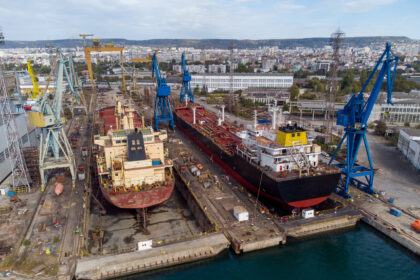European Shipowners Advocate for 40% Local Production of Clean Fuels
The European Community Shipowners’ Association (ECSA) has called for a significant increase in the local production of clean fuels to support the shipping industry’s green and digital transition. In its recent position paper, the ECSA outlined recommendations for a European Maritime Industrial Strategy, highlighting the geopolitical importance of European shipping and its role in the continent’s energy, food, and supply chain security.
The Importance of European Shipping
European shipping controls 39.5% of the global tonnage, making it a vital economic and geopolitical asset for Europe. ECSA emphasized that shipping must be a core focus of the upcoming Clean Industrial Deal, which is expected to be introduced in the first 100 days of the new European Commission, led by President von der Leyen.
The recommendations put forward by European shipowners aim to enhance competitiveness while meeting the green and digital goals of the European Union.
Key Recommendations from ECSA
1. Maintaining International Competitiveness
The ECSA stressed the importance of keeping European shipping competitive on a global scale. This involves ensuring a level playing field with non-European competitors and maintaining a regulatory and taxation framework that fosters growth. European shipping companies need such measures to remain profitable and globally competitive.
2. Scaling Up Clean Fuel Production
To achieve the FuelEU maritime targets, the ECSA called for at least 40% of clean fuels required for shipping to be produced within Europe. This would align with the Net-Zero Industry Act, and the ramping up of clean fuel production is seen as crucial for Europe’s green transition in shipping.
3. Innovative Shipping Technologies
Europe is currently at the forefront of innovation in the shipping industry. The ECSA recommended that at least 40% of European industrial capacity should be dedicated to producing key technologies that facilitate the green and digital transition of shipping. Such technologies are crucial for maintaining Europe’s leadership in maritime innovation.
4. Access to Finance for Investments
The position paper highlighted the importance of enhanced access to public and private financing to support key investments in clean and digital shipping. The ECSA proposed that revenues from the EU Emissions Trading System (ETS) should be reinvested in activities that decarbonize the shipping sector. Furthermore, a variety of financing mechanisms, such as capital markets, private investors, and banking finance, should be made available to share the risks of innovative shipping projects.
5. Reskilling Europe’s Workforce
The ECSA underscored the need for a people-centered transition. Approximately 800,000 seafarers will need to be reskilled by 2030 to meet the requirements of the green and digital transition. The European Maritime Industrial Strategy must prioritize investing in these new skills, with support from the European Commission and Member States.
Conclusion
The ECSA’s recommendations for a European Maritime Industrial Strategy highlight the importance of increasing local production of clean fuels, ensuring competitiveness, and supporting workforce reskilling. By doing so, Europe can maintain its leadership in the global shipping industry while transitioning towards a greener and more digital future.







The articles you write help me a lot and I like the topic
You’ve the most impressive websites.
Great content! Super high-quality! Keep it up!